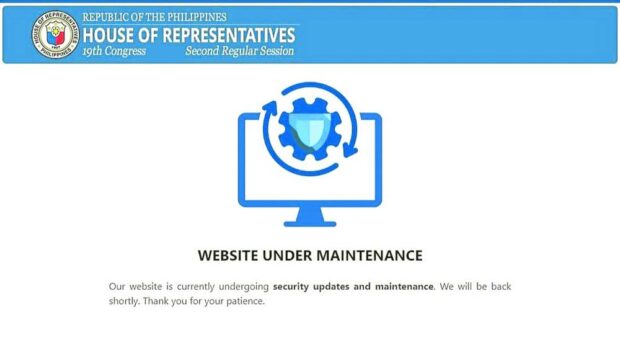House website taken down for another security check

The House website, https://congress.gov.ph/, was no longer accessible around Tuesday noon. Its homepage stated that it was “undergoing security updates and maintenance” and that it would be restored soon.
“Despite our recent security enhancements, we have detected suspicious and unusual activities that necessitate further scrutiny,” House Secretary General Reginald Velasco said in a statement sent to reporters.
This came as Senate secretary Renato Bantug Jr. disclosed on Tuesday that cybercriminals had tried but failed to access the website of the upper chamber on the same day the House website was hacked.
According to Bantug, their online security firewall detected a deluge of “malicious” logins on their website around noon Sunday.
But he stressed that the incident did not compromise any official records of the Senate.
Besides, Bantug said, their website did not contain sensitive or confidential information.
“For government institutions like the Senate where most of the data are public, it’s just them trying to vandalize or put graffiti in the homepage, or deny (the delivery) of service by brute force,” he said.
READ: Poe to DICT: Act quickly on ‘hacking spree’ of gov’t websites
READ: Solon wants SIM card registration suspended after hacking of gov’t sites
Precaution
Velasco said the voluntary takedown of the House website was a “precautionary measure to double-check and reinforce the cybersecurity measures we have undertaken, ensuring no vulnerabilities remain.”
“Our primary concern is to guarantee the safety, integrity, and reliability of our digital platform for the citizens we serve,” he added.
An IT (information technology) team of the House found that there were attempts to exploit other backdoors and weaknesses to break into the website on Monday night, prompting them to recommend its temporary takedown.
Arnold de Castro, IT chief in the House, said this was discovered in a vulnerability scan done overnight after the website was first restored on Monday afternoon.
“There were attempts, and there were logs that showed it. We saw vulnerabilities in the scan. So we opted to take it down first and close the vulnerabilities before we put it back up,” De Castro told House reporters in an interview on Tuesday.
“Our security was weak, so they breached it,” he said.
De Castro likened it to “opening a can of worms” in the sense that other parties might be trying to attempt to break into the House website after Sunday’s hacking incident.
Unusual volume
At the Senate, Bantug said the unusual volume of requests for access to the upper chamber’s website on Sunday was almost triple the usual daily traffic that it usually got.
“Our anti-hacking software considered these requests as ‘malicious.’ Fortunately for us, we were able to mitigate all the attempts,” he told reporters.
“The (software) program is actually designed to detect the behavior of the requests. Using an algorithm, it detects a malicious (request) and would try to arrest or mitigate it,” he said.
Director Mario Antonio Sulit, head of the Senate Electronic Data Processing and Management Information System Bureau, said the attacks were carried out by bots, a software program created to perform specific tasks.
He said the login attempts were done by users located in Germany, the United States, Vietnam, and the Philippines.
But Sulit said it was possible that the hackers were just using a virtual private network (VPN) to hide their real IP (internet protocol) address. “It’s possible that they are not really from Germany,” he said